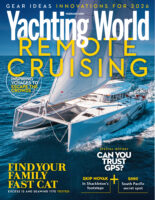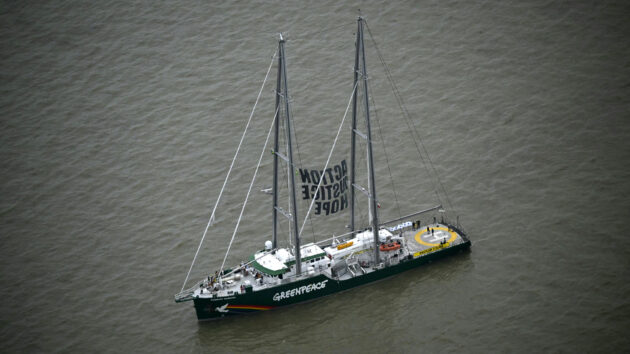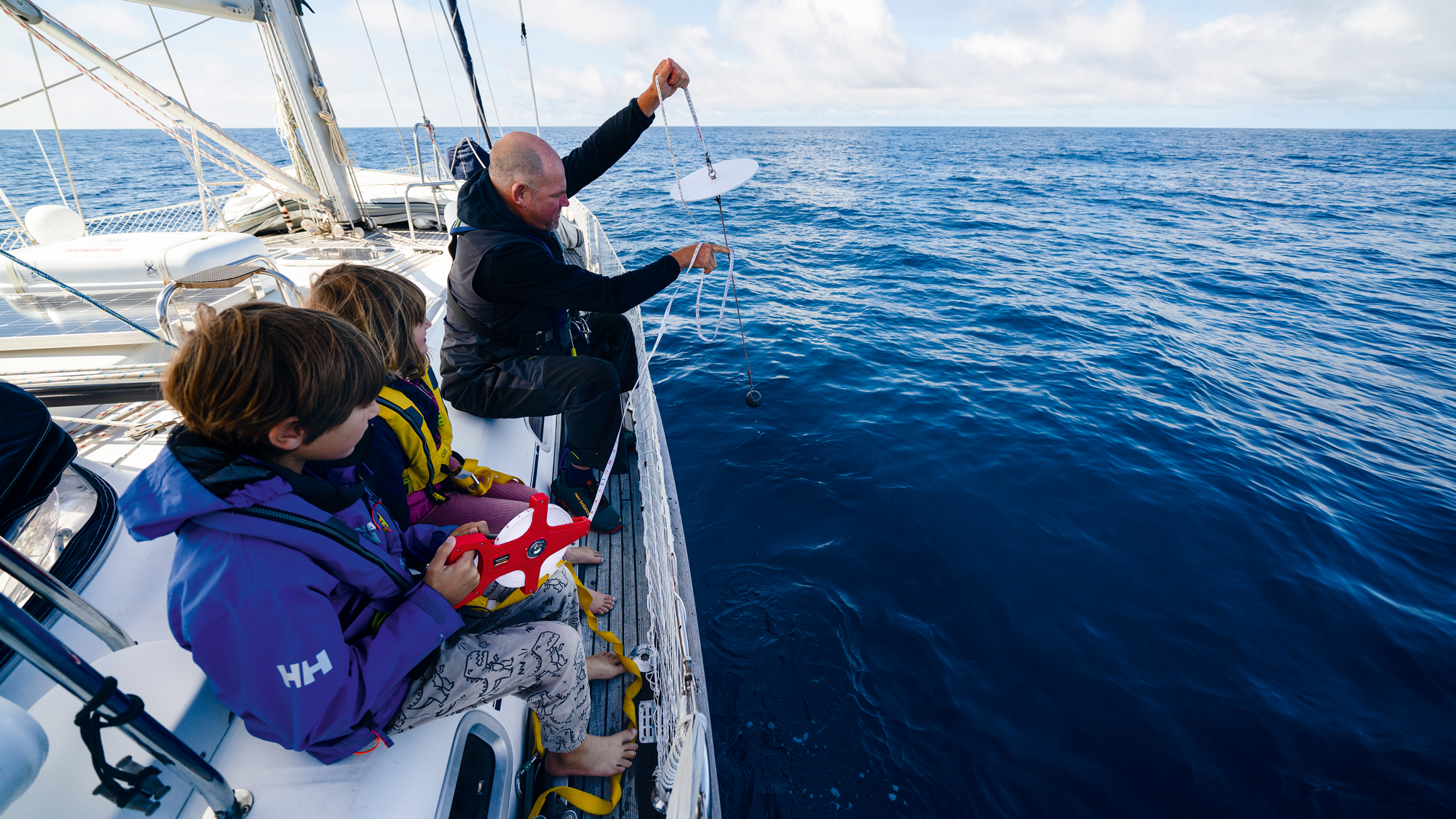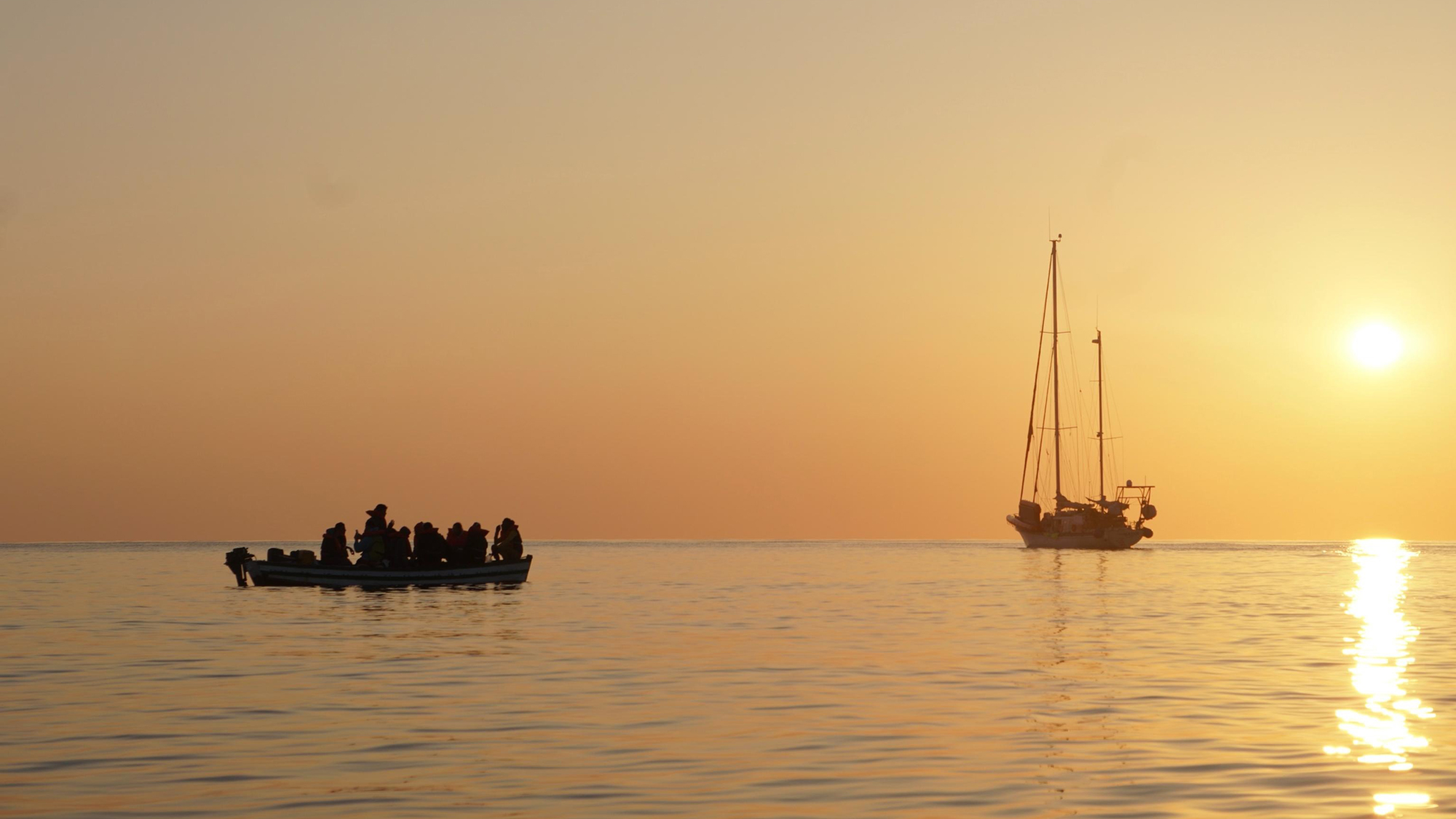From the People's Summit Flotilla to ocean advocacy events from the Ocean Race, the UN Climate Conference highlighted powerful connections between the sailing community and climate talks. Catch up on your COP30 sailing summary here.
‘Oceans must be at the forefront of climate discussions,’ says CEO of COP30 Ana Toni.
With ocean issues at its centre, it’s no wonder this week’s UN Climate Conference in Belém, Brazil included members from across the sailing community. From sportsmen to sailing activists to race officials, here’s who sailed to the UN Climate Conference and why.
Cop30 sailing news at a glance
- Greepeace and the People’s Summit Flotilla in the waters of Belém
- The Ocean Race highlights what climate leadership can learn from the sailing mindset
- Crews from Voices of and Ocean Institute and the Women Wave Project sail into the conference
- COP30’s Ocean-first topics that sailors will want to know about, including the Blue Package and the High Seas Treaty
The People’s Summit Flotilla takes to the waters around COP30
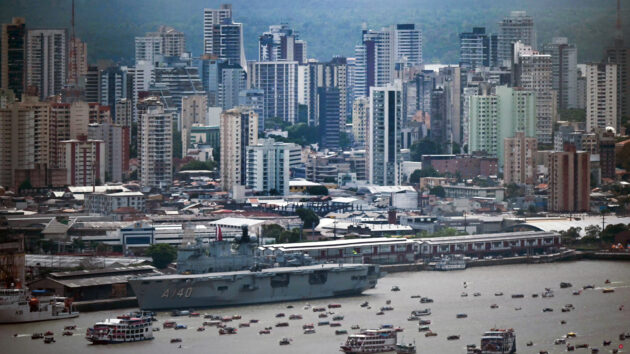
Over 150 boats with members of indigenous communities and social organisations sailed the Guama River as part of a symbolic crossing during the COP30, according to organisers. Photo: Mauro PIMENTEL / AFP.
Ahead of COP30, more than 5,000 people across 200 vessels sailed in the waters of Belém as part of the People’s Summit Flotilla in the hopes of demonstrating that a sustainable future is built not by industry, but by mobilising on a community level.
In attendance was Greenpeace’s iconic fishing trawler-turned sail-power ship, the Rainbow Warrior, the second ship to bear this name after its predecessor’s infamous sinking by French secret service agents.
Executive Director of Greenpeace Brazil Carolina Pasquali commented:
‘The thousands of people in the flotilla today are showing the strength of a unified global movement — communities who have been impacted by extreme weather events and by companies profiting from the destruction of our planet, Indigenous Peoples who have been fighting for generations for their rights, their lands and the forest, and civil society demanding real action from world leaders and negotiators at COP.’
Inside COP30: The Ocean Race tackles ocean advocacy
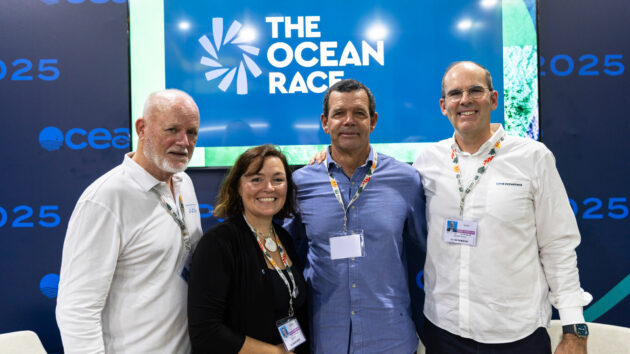
Photo: Sophie Valerie Hulme / The Ocean Race.
Inside the conference, sailor-driven events highlighted the importance of protecting the oceans to address climate change.
In a panel titled ‘Racing for the Ocean: Faster and Smarter’, the Ocean Race brought Brazilian sailing icon, Olympic champion, and winner of the 2008-2009 Ocean Race Torben Grael together with global experts to explore the findings of the Planetary Health Check 2025.
Talks between Grael, UN Secretary-General’s Special Envoy for the Ocean Peter Thomson, Ocean Impact Director at The Ocean Race Lucy Hunt, and Race Chairman of The Ocean Race Richard Brisius highlighted the urgent need to protect natural carbon sinks, reinforce ocean science, and revitalise humanity’s connection to the ocean.
‘Ocean health is currently, measurably, in decline,’ commented Thomson. ‘But there is hope. Around the world, ocean science is advancing at a pace we have never seen before.’
What can climate leaders can learn from sailing?
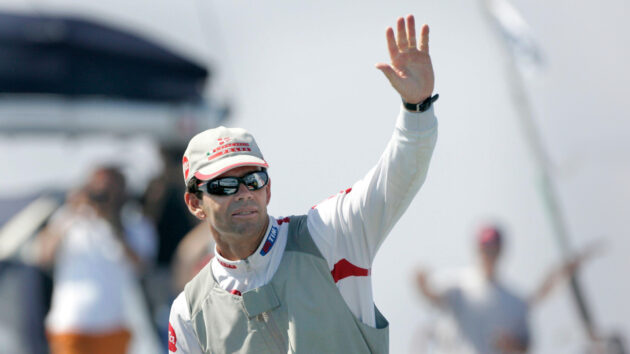
Torben Grael after winning the semi finals, race 5, against U.S. BMW Oracle of the Louis Vuitton Cup in 2007. He was Italy’s Luna Rossa Challenge Tactician. Photo: Associated Press / Alamy.
As the ‘Racing for the Oceans’ panel’s sailor-in-residence, Grael identified elements from the sailing mindset that can help climate leaders face uncertainty, solve problems under pressure, and persist as they work to protect the oceans.
‘Sailing is a very difficult sport because it involves water and wind, both unpredictable and sometimes dangerous,’ he explained. ‘We must analyse what went wrong, decide what to correct, and make it better next time,’ Grael says. ‘That is how we win this race for the ocean.’
‘Just as sailors navigate the unknown with courage, determination, and teamwork, the world must chart a new course, one that respects planetary boundaries and safeguards the ocean for future generations,’ adds Brisius. ‘Sailors depend on the ocean: it is our racetrack, our home, our teacher. We have a responsibility to protect it.’
‘Racing for Oceans’ builds on the Ocean Race’s wider efforts to put ocean advocacy at the forefront of racing, which include sailor-led offshore data collection and stopover events dedicated to conservation.
More sailing crews mooring up for COP30
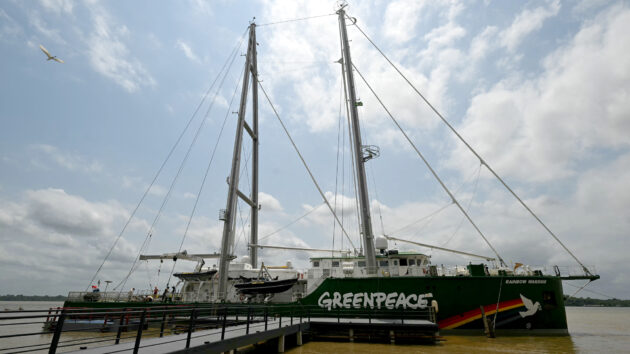
The Greenpeace ‘Rainbow Warrior’ ship docks at the riverbank of the Federal University of Para (Orla da UFPA), Belem, Brazil for COP30 UN Climate Summit. Photo: Mauro PIMENTEL / AFP.
Heloisa Schurmann, co-founder of Brazilian global-impact initiative Voice of the Oceans Institute (VOI), sailed 3,000 miles from St Helena to Brazil to attend COP30 with the sustainable sailboat Kat.
Kat docked in Belèm from early November, giving visitors a chance to get onboard for a firsthand look at the sustainable onboard technologies developed in collaboration between VOI and global electronics company WEG.
VOI and WEG also teamed up on the Casa Vozes do Oceano, a free exhibition space open to the public, where they are presenting a series of activities to promote ocean protection and recovery through science, education, and innovation.
‘Voice of the Oceans is not just an expedition,’ Schurmann wrote from onboard. ‘It is a call. An invitation for every person, institution, and government to listen to what the sea has to say. We are bringing to Belém—and to COP30—not only data and alarming evidence, but also inspiring stories of those who chose to take action.’
The Women Wave Project
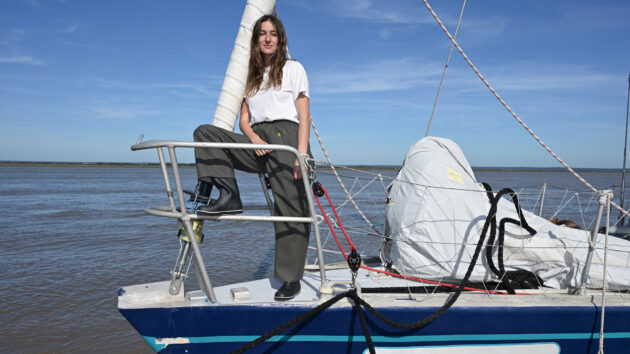
French climate activist Camille Etienne before sailing with other activists to COP30 on L’Esprit d’Equipe. Photo: Damien Meyer / Getty.
The Women Wave Project, supported by Amnesty International Belgium, brought an all-female crew of sailors and activists from Saint-Nazaire, France to Brazil onboard the legendary French racing yacht L’Esprit d’equipe, winner in her class of the 1985-86 Whitbread Round the World Race.
‘Crossing the Atlantic with women only was both intense and deeply symbolic,’ said crew member Maïté Meeûs, Brussels-based feminist and founder of an NGO that support survivors of sexual violence. ‘We wanted to embody the message we’re bringing to the COP: that women are always on the front line of crises, yet rarely at the decision table.’
The Women Wave Project is accredited within the Belgian delegation, and has taken part in both the public “green zone” and the official “blue zone” for state delegations at COP30.
Oceans at the centre of COP30
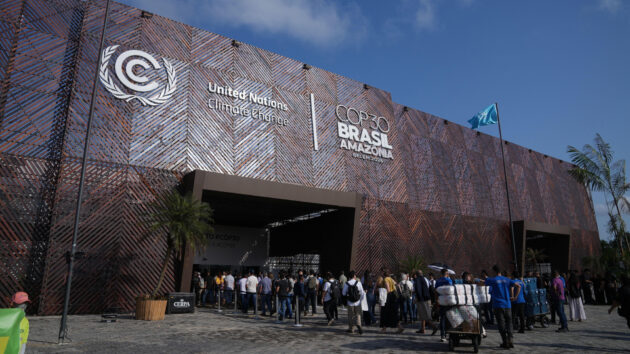
Attendees line up to get into the COP30 U.N. Climate Summit, Monday, Nov. 10, 2025, in Belem, Brazil. Photo: Fernando Llano / Getty.
These sailors were part of more than 55,000 participants in attendance at COP30, where talks focused on the dual priority of protecting the world’s oceans and its forests.
In the ocean sphere, three primary initiatives were front and centre.
First, explicitly including ocean resources in Brazil’s Nationally Determined Contribution (NDC), or its climate impact plan, in order to foreground the ocean in its measurement of climate progress and to provide a ocean-inclusive impact model for other nations.
Second, coordinating the Blue Package, a roadmap for accelerating ocean climate solutions by 2028.
Finally, talks centred not only the ratification but the implementation of the High Seas Treaty, also known as the global BBNJ (Biodiversity Beyond National Jurisdiction) agreement, which will become effective in January 2026 after reaching the 60 ratifications needed to trigger its entrance into force.
The High Seas Treaty establishes Marine Protected Areas in two-thirds of the world’s oceans and creates a legal framework for governing the worlds commons. In the marine sphere, this includes marine life and environments in areas outside of national jurisdiction, such as the high seas and the international seabed, and their possible use in practices such as commercial fishing and deep sea mining.
Its funding and implementation will be discussed at BBNJ COP1 in late 2026.
The ocean citizen science being carried out on yachts
There is a fierce and surprisingly passionate debate unfolding on the deck of Freeranger, our 50ft Beneteau. The question at…
‘Mass casualty we face very often,’ says skipper of search and rescue sailing yacht in the Central Med
‘I read in the newspaper about people drowning in the Central Med, and I asked myself whether I needed to…
 If you enjoyed this article about COP30….
If you enjoyed this article about COP30….
Yachting World is the world’s leading magazine for bluewater cruisers and offshore sailors. Every month we have inspirational adventures and practical features to help you realise your sailing dreams.Build your knowledge with a subscription delivered to your door. See our latest offers and save at least 30% off the cover price.
Note: We may earn a commission when you buy through links on our site, at no extra cost to you. This doesn’t affect our editorial independence.

